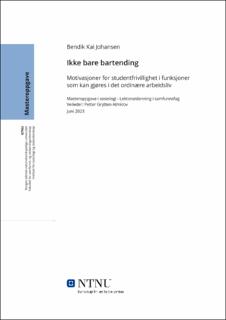Ikke bare bartending
Master thesis

Permanent lenke
https://hdl.handle.net/11250/3080838Utgivelsesdato
2023Metadata
Vis full innførselSamlinger
Sammendrag
Denne masteroppgaven undersøker motivasjoner bak studenters valg om å utføre frivillige arbeidsoppgaver på Studentersamfundet i Trondhjem. Undersøkelsen ble gjennomført gjennom dybdeintervjuer med syv frivillige fra kaféen på Studentersamfundet, Edgar, og restauranten på Studentersamfundet, Lyche. Oppgaven tar for seg motivasjonen bak frivillig arbeid i disse stillingene, i stedet for å gjøre lignende oppgaver mot betaling et annet sted. Jeg undersøker fire underproblemstillinger for å nyansere dette: (1) Hvorfor man søker seg til frivillig arbeid, (2) Hvorfor en fortsetter som frivillig, (3) oppfatning av motytelse og goder i fravær av økonomisk motytelse, og (4) om de frivillige betrakter sine oppgaver som noe annet enn en "jobb".
Datamaterialet analyseres og diskuteres ved hjelp av ulike sosiologiske bidrag, som kan deles i de tre hovedområdene arbeidssosiologi, frivillighetssosiologi og fellesskapsorientert sosiologi. Oppgavens hovedfunn kan sies å være Studentersamfundet som en sosial organisasjon. Ønsket om en sosial studietid, sammen med ryktet Studentersamfundet har, som en historisk organisasjon i Trondheims studentsfære, som attpåtil fostrer mye sosialt blant de frivillige, gjør at mange kan velge å prioritere verv på Studentersamfundet, selv om en kunne fått betalt for lignende oppgaver. Andre funn inkluderer den frie rollen baristaen og barservitøren har, med å kunne interagere både med andre ansatte og kunder. Jeg bruker begrepet «Samfundsansvar» for å forklare hvordan motivasjonen kan bli mer kollektiv med tiden, og «det sosiale isfjellet» for alt sosiale en får tilgang til, men ikke nødvendigvis vet en blir med på når en søker seg som frivillig på Studentersamfundet. Privatøkonomiske implikasjoner av frivillighet, hos de frivillige, diskuteres dessverre ikke like mye som det optimalt hadde gjort, men «mangelen» på flere eksplisitte innspill omkring dette diskuteres også. This master's thesis examines the motivations behind students' choices to perform voluntary tasks at the Student Society in Trondheim, Studentersamfundet. This study was conducted through in-depth interviews with seven volunteers from the café at Studentersamfundet, Ed-gar, and the restaurant at Studentersamfundet, Lyche. The thesis explores the motivations for voluntary work in these positions, instead of engaging in similar tasks for payment else-where. To provide a nuanced understanding, four sub-questions are examined: (1) reasons for becoming a volunteer, (2) reasons for continuing as a volunteer, (3) perceptions of compensa-tion and benefits in the absence of monetary rewards, and (4) whether the volunteers view their tasks as something other than a "job."
The data material is analyzed and discussed using various sociological contributions, which can be divided into three main areas: the sociology of labour, volunteer-sociology, and com-munity-oriented sociology. The main finding of the thesis is the significance of Studenter-samfundet as a social organization. The desire for a social student life, along with Studenter-samfundet’s reputation as a historical organization within the Trondheim student community, with significant social interaction among its volunteers, leads many to prioritize positions at Studentersamfundet, even if they could receive payment for similar tasks. Other findings include the autonomy of the barista and bartender roles, allowing for interaction with both colleagues and customers. I use the term "Samfundsansvar" to explain how motivation can become less about personal gain and more about “the greater good” over time, and "the so-cial iceberg" to represent all the social aspects one gains access to as a volunteer at Stu-dentersamfundet, which one may not be fully aware of when one first becomes a volunteer. Unfortunately, the discussion of the volunteers' private financial implications of volunteering is not as extensively addressed as it ideally would have been, but the lack of more explicit input on this topic is also addressed.